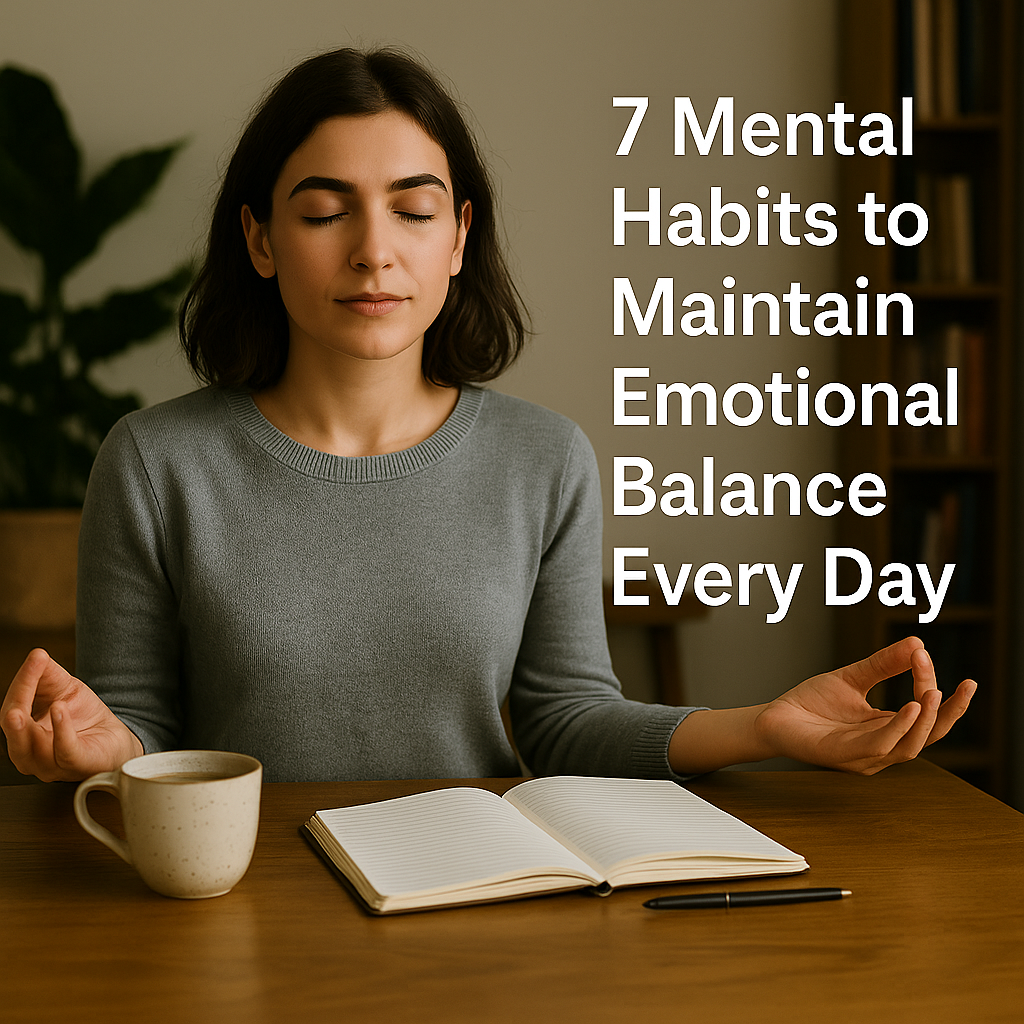Staying emotionally balanced in today’s fast-paced world isn’t about avoiding stress altogether—it’s about how you respond to it. Emotional balance doesn’t mean you’re happy all the time, but that you know how to process your feelings in a healthy and resilient way.
If you’re feeling mentally scattered, moody, or emotionally reactive more often than you’d like, you’re not alone. But the good news is that emotional balance can be trained and strengthened, just like a muscle.
In this article, we’ll explore 7 powerful mental habits that can help you maintain emotional stability, even when life gets chaotic.
1. Practice Self-Awareness Every Morning
The first step toward emotional balance is self-awareness. This means tuning in to how you feel emotionally, physically, and mentally before the day sweeps you away.
How to do it:
- When you wake up, take 2–5 minutes to check in with yourself.
- Ask: “How am I feeling right now?”
- Write it down or just acknowledge it.
Understanding your emotional state at the start of the day helps you respond more thoughtfully rather than reacting impulsively throughout the day.
2. Respond, Don’t React
A reactive mind acts impulsively based on emotions. A responsive mind pauses, reflects, and then chooses the best course of action.
Mental habit to build:
- When something upsets you, take a deep breath.
- Count to 10 before saying or doing anything.
- Ask yourself: “Is this how I want to handle this situation?”
The pause is powerful. It’s where logic, wisdom, and emotional intelligence live.
3. Reframe Negative Thoughts
Everyone experiences negative thinking, but emotionally balanced people don’t get stuck in those thoughts. They challenge them and reframe the narrative.
Example:
- Thought: “I can’t handle this.”
- Reframe: “This is hard, but I’ve handled difficult things before.”
Mental habit:
- Catch negative self-talk.
- Replace it with a more compassionate and realistic view.
This doesn’t mean ignoring reality—it means approaching challenges with a growth mindset.
4. Focus on What You Can Control
A major source of emotional stress is obsessing over things outside of your control—like the economy, other people’s opinions, or unexpected events.
How to shift your focus:
- Write down what’s bothering you.
- Circle what’s in your control.
- Let go of the rest.
Instead of trying to control the uncontrollable, invest your energy in your responses, routines, and mindset.
5. Practice Daily Gratitude
Gratitude shifts your brain away from survival mode and into a state of contentment and presence. It grounds you in what is going right, rather than obsessing over what’s going wrong.
Simple gratitude habit:
- Each evening, write down 3 things you’re grateful for.
- They can be big or small: a kind word, a delicious meal, or sunshine.
Over time, this rewires your brain to notice positive moments more often, which leads to greater emotional stability.
6. Allow Yourself to Feel Without Judgment
Avoiding emotions only makes them stronger. Bottling them up creates tension and can lead to emotional outbursts later. Emotionally healthy people allow themselves to feel everything, but they don’t let emotions control their actions.
How to do this:
- When a strong emotion arises, name it: “I feel sad,” “I feel frustrated,” etc.
- Breathe through it.
- Remind yourself: “Emotions are temporary. They come and go.”
Naming emotions reduces their intensity and helps you process them more rationally.
7. Create Emotional Recharge Points in Your Day
Just like your phone needs recharging, so does your emotional energy. Without regular mental breaks, stress builds up and balance slips away.
Ideas for emotional recharge:
- A 10-minute walk outdoors
- Deep breathing exercises
- Listening to calming music
- Journaling your thoughts
- Taking a mindful pause with tea or water
These moments don’t have to be long—they just have to be intentional.
Extra Tips to Strengthen Your Emotional Core
- Limit social media: Constant scrolling can impact self-worth and mood.
- Get enough sleep: Lack of rest makes emotional regulation harder.
- Move your body: Physical activity helps release stored tension.
- Connect with others: Healthy relationships act as emotional anchors.
- Create a bedtime routine: Ending your day calmly helps restore mental balance overnight.
Signs You’re Becoming More Emotionally Balanced
You might not notice progress overnight, but here are some subtle signs that your mental habits are working:
- You recover faster from disappointments
- You feel less overwhelmed by challenges
- You respond more calmly in tense situations
- You’re more patient—with others and yourself
- You feel more grounded and present
Even if emotions still fluctuate (they always will), your response becomes wiser and more grounded.
Your Mind Deserves Kindness Too
Caring for your emotional health isn’t weak—it’s powerful. These 7 habits help build emotional resilience, which allows you to face life’s highs and lows without losing yourself in the process.
Remember: You are allowed to pause. You are allowed to feel. You are allowed to take care of your mind with the same love you give to others.
Practice these habits daily, not to become perfect—but to become more at peace with yourself.

